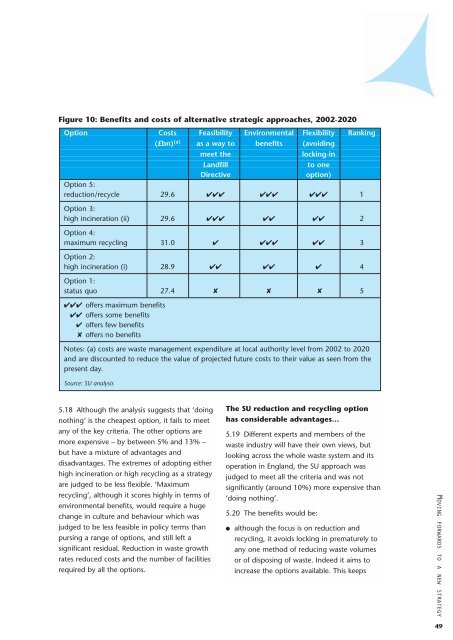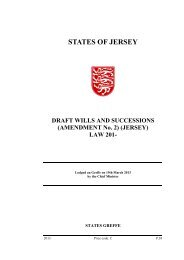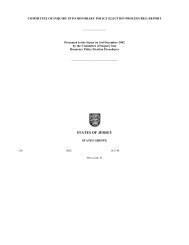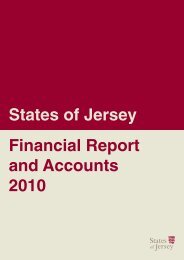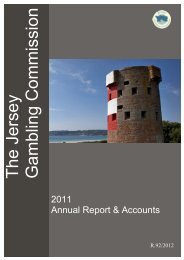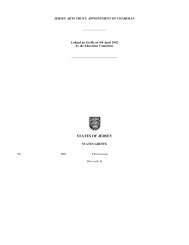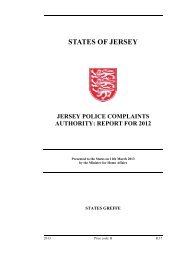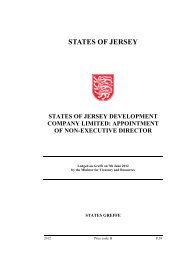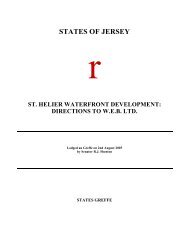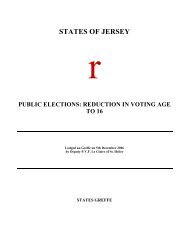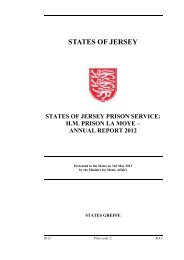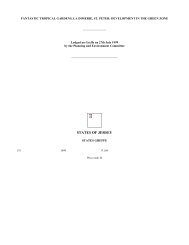Waste not want not - States Assembly
Waste not want not - States Assembly
Waste not want not - States Assembly
Create successful ePaper yourself
Turn your PDF publications into a flip-book with our unique Google optimized e-Paper software.
Figure 10: Benefits and costs of alternative strategic approaches, 2002-2020<br />
Option Costs Feasibility Environmental Flexibility Ranking<br />
(£bn) (a) as a way to benefits (avoiding<br />
meet the<br />
locking-in<br />
Landfill<br />
to one<br />
Directive<br />
option)<br />
Option 5:<br />
reduction/recycle 29.6 ✔✔✔ ✔✔✔ ✔✔✔ 1<br />
Option 3:<br />
high incineration (ii) 29.6 ✔✔✔ ✔✔ ✔✔ 2<br />
Option 4:<br />
maximum recycling 31.0 ✔ ✔✔✔ ✔✔ 3<br />
Option 2:<br />
high incineration (i) 28.9 ✔✔ ✔✔ ✔ 4<br />
Option 1:<br />
status quo 27.4 ✘ ✘ ✘ 5<br />
✔✔✔ offers maximum benefits<br />
✔✔ offers some benefits<br />
✔ offers few benefits<br />
✘ offers no benefits<br />
Notes: (a) costs are waste management expenditure at local authority level from 2002 to 2020<br />
and are discounted to reduce the value of projected future costs to their value as seen from the<br />
present day.<br />
Source: SU analysis<br />
5.18 Although the analysis suggests that ‘doing<br />
<strong>not</strong>hing’ is the cheapest option, it fails to meet<br />
any of the key criteria. The other options are<br />
more expensive – by between 5% and 13% –<br />
but have a mixture of advantages and<br />
disadvantages. The extremes of adopting either<br />
high incineration or high recycling as a strategy<br />
are judged to be less flexible. ‘Maximum<br />
recycling’, although it scores highly in terms of<br />
environmental benefits, would require a huge<br />
change in culture and behaviour which was<br />
judged to be less feasible in policy terms than<br />
pursing a range of options, and still left a<br />
significant residual. Reduction in waste growth<br />
rates reduced costs and the number of facilities<br />
required by all the options.<br />
The SU reduction and recycling option<br />
has considerable advantages…<br />
5.19 Different experts and members of the<br />
waste industry will have their own views, but<br />
looking across the whole waste system and its<br />
operation in England, the SU approach was<br />
judged to meet all the criteria and was <strong>not</strong><br />
significantly (around 10%) more expensive than<br />
‘doing <strong>not</strong>hing’.<br />
5.20 The benefits would be:<br />
●<br />
although the focus is on reduction and<br />
recycling, it avoids locking in prematurely to<br />
any one method of reducing waste volumes<br />
or of disposing of waste. Indeed it aims to<br />
increase the options available. This keeps<br />
MOVING FORWARDS TO A NEW STRATEGY<br />
49


